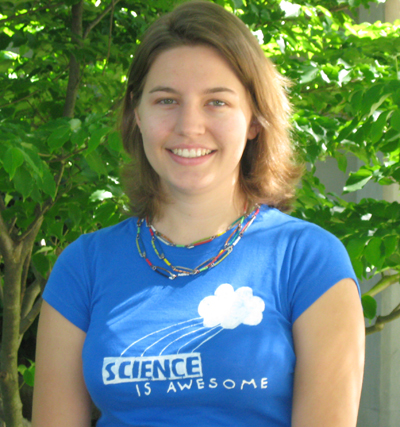Friday, May 21, 2010
by Meaghan Haugh
Natalie Baggett of Frederick, Md., a junior Biology major, did not get homesick during her first semester at Rider. Instead, she was lab sick.
Since her junior year of high school, Baggett had spent her after-school hours and summers studying antiviral protein to treat FIV (Feline Immunodeficiency Virus) inside the research laboratories at the National Cancer Institute (NCI) at Frederick in Maryland.
“I had always been interested in science,” explained Baggett, wearing a homemade “Science is Awesome” T-shirt, which she adapted from the film, Cloudy with a Chance of Meatballs. “My brother had the same experience at NCI four years earlier. After I expressed an interest in science, my mom suggested that I apply, so I spoke to my school guidance counselor and became involved. It was a really great experience.”
Fortunately, Baggett also expressed her interest of research to Dr. Kelly Bidle, associate professor of Biology, during her freshman summer orientation at Rider. Since Baggett was also accepted into the freshman Biology Honors program, she was able to begin researching in the Rider’s laboratories during her second semester. For the past three years, Baggett has been studying in Bidle’s laboratory.
“When I met her that summer during orientation, I realized that she was a bright student. Then I found out that she was interested in microbiology. I told her, ‘I would love for you to work in my laboratory, but explore your options,’” Bidle said. “I was really happy when she decided to work in my lab.”
Recently, Baggett, under the guidance of Bidle, has begun studying how a particular protein, caspase, might trigger cell death in Archaea, the second major prokaryotic domain of life. These microbes exist in extreme environments. Preliminary findings, entitled “Tantalizing evidence for caspase-like protein expression and activity in the cellular stress response of Archaea,” conducted by Bidle, Baggett and three other authors was recently published in the May 2010 issue of Environmental Microbiology.
“Further research will allow us to understand these extremophiles more. The more we understand them, the more we can understand what kind of impact we have on these microbes,” Baggett explained.
Baggett plans to continue her research this summer on the Lawrenceville campus. Recently, she received an American Society for Microbiology Undergraduate Research Fellowship. The award is reserved for the nation’s best and brightest rising young scientists, and comes with a generous $4,000 stipend to support research in microbiology. More than 70 undergraduate students from across the nation apply for the fellowship each year.
Baggett is the fifth student in Bidle’s lab to receive this prestigious award in the last six years. Bidle has reviewed applications for the ASM scholarship in the past. From her perspective, she knows the competition her students face when they apply.
“The fellowship is prestigious because only 10 to 15 percent of applications are awarded annually,” she explained. “These awards are well deserved, but I feel really fortunate that my students are able to receive these scholarships.”
In addition to her research, Baggett is a tutor in the University’s Student Success Center, where she assists students in BIO-117 Biology of Cells. She is also a mentor in the Science Learning Community, a program where upperclassmen help freshmen who have questions regarding academics and social life.
“She’s outstanding as both a student and as a researcher,” Bidle said.

